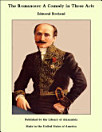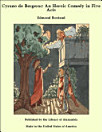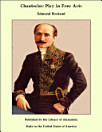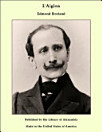Cyrano de Bergerac
Mar 2020 · Otbebookpublishing
Ebook
100
Pages
family_home
Eligible
info
reportRatings and reviews aren’t verified Learn More
About this ebook
Hercule Savinien Cyrano de Bergerac, a cadet (nobleman serving as a soldier) in the French Army, is a brash, strong-willed man of many talents. In addition to being a remarkable duelist, he is a gifted, joyful poet and is also a musician. However, he has an extremely large nose, which causes him to doubt himself. This doubt prevents him from expressing his love for his distant cousin, the beautiful and intellectual Roxane, as he believes that his ugliness would prevent him the "dream of being loved by even an ugly woman."
About the author
Edmond Rostand (1868-1918) was a French playwright and poet whose works captured the spirit of the Belle Époque, a period marked by cultural flourishing and optimism before the devastation of World War I. Born into a wealthy and cultured family in Marseille, Rostand was exposed to literature and the arts from an early age, which significantly influenced his writing style. Rostand's plays are characterized by their wit, romanticism, and elaborate verse, standing in stark contrast to the naturalistic and realist trends of his time. His most famous works often featured heroic characters and grandiose themes, which resonated deeply with audiences seeking escapism and idealism.One of Rostand's most notable contributions to literature was his revival of the heroic comedy, a genre that had fallen out of favor. His ability to blend humor, drama, and poetic dialogue set a new standard for theatrical productions and inspired a generation of playwrights and poets.Despite his successes, Rostand faced criticism from some contemporaries who viewed his work as overly sentimental and anachronistic. However, his ability to evoke deep emotional responses and his mastery of the French language earned him a lasting place in literary history.Rostand's influence extended beyond the stage; his themes of unrequited love, honor, and the human spirit's resilience continue to resonate with modern audiences. His legacy is a testament to the enduring power of romanticism and the timeless appeal of well-crafted storytelling.
Rate this ebook
Tell us what you think.
Reading information
Smartphones and tablets
Install the Google Play Books app for Android and iPad/iPhone. It syncs automatically with your account and allows you to read online or offline wherever you are.
Laptops and computers
You can listen to audiobooks purchased on Google Play using your computer's web browser.
eReaders and other devices
To read on e-ink devices like Kobo eReaders, you'll need to download a file and transfer it to your device. Follow the detailed Help Center instructions to transfer the files to supported eReaders.






